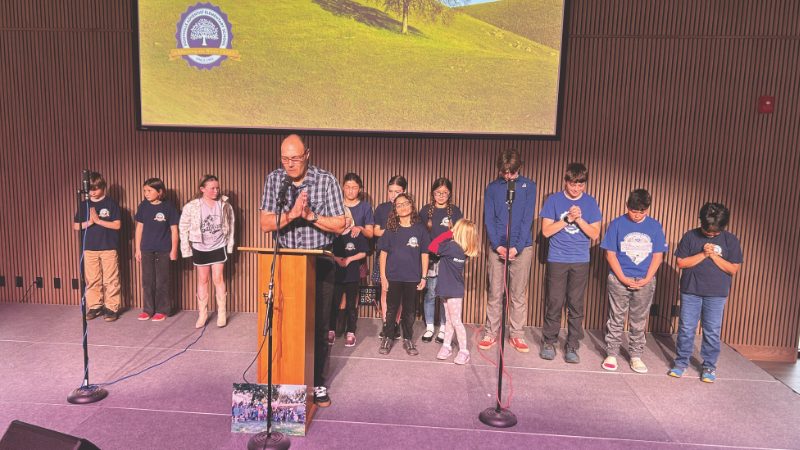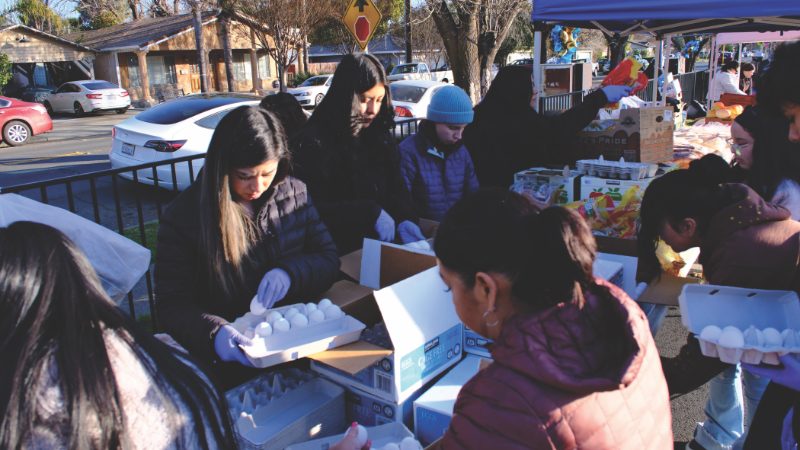The blessing of Christian stewardship lies not only in the act of giving but also in what it encourages us to give. Christian stewardship means to look beyond our own needs and consider how our wealth can be used to further God’s kingdom. Not only does this provide a greater sense of purpose, it also helps open up conversations about issues like poverty, inequality, and injustice—all topics that can be intimidating or uncomfortable for some people. The Bible teaches us that everything is a gift from God, so when we are generous with the resources with which He has blessed us (treasures, time, and talents), we can use them to further His kingdom. This means using our financial gifts to support missions and ministries, volunteering our skills and abilities in service of others, or simply offering up a few hours of our week to help those in need. No matter what form it takes, Christian giving should always be done with an open heart and mind—for when we give freely out of love for God and His people, the blessings will follow for both the giver and the receiver. The series of five articles on stewardship beginning on p. 8 was written by Charles Mills—a frequent contributor located in West Virginia—based on material provided by the Recorder staff.
THE WIDOW'S MITE I Havenlight Publishing by James Christensen
The Creation account promotes the often elusive joining of human beings in mind, body, and spirit. Relationship, both earthly and divine, is the second perpetual monument established in Eden, right after the Sabbath.
God created Adam as a perfect being, placed him in a perfect setting, and gave him a perfect assignment—to care for the world and everything in it. But something was missing. “It is not good for the man to be alone,” God decided. “I will make a helper suitable for him” (Genesis 2:18). Humans, it seems, are social beings and cannot be fulfilled and satisfied without quality, person-to-person relationships. It’s part of who we are.
At the heart of Jesus’ Sermon on the Mount, we find an emphasis on the necessity of prioritizing another relationship. “But seek first his kingdom” (Matthew 6:33). Kingdoms have kings. The Gospels speak of “His kingdom,” “the kingdom of the Father,” “the kingdom of God.” And how do we seek that kingdom? By getting to know the Ruler who sits on its throne.
The Gospels reveal how Jesus prioritized His own relationship with His Father. One insightful incident took place in Capernaum. “Very early in the morning, while it was still dark, Jesus got up, left the house and went off to a solitary place, where he prayed” (Mark 1:35). This special time of Jesus with His father was happening during the first hour of Sunday morning. The previous day had been the Sabbath—the time set apart for relationship building between humans and the divine. Yet, after one full day of such encounters, the first thing Jesus did when He woke up on Sunday morning was to seek again that sweet fellowship.
We can make two beautiful deductions here. First, maintaining a relationship with God is not confined to the Sabbath, and second, the point of social saturation with the divine is never reached.
What was the result of this constant companionship with His Heavenly Father? “So he traveled throughout Galilee, preaching in their synagogues and driving out demons” (Mark 1:39). A relationship with God leads to a sustainable and effective outflowing of divine power. Weakness in one’s spiritual life and ministry may be an indicator of a lack of that vital, power-building interaction.
Top priority
The Gospel of Luke tells two stories of individuals who decided to make relationship their top priority.
Martha had a great sense of hospitality. She welcomed Jesus into her house and did everything to attend to His needs. However, her courtesy and good manners were preventing her from experiencing something even more essential.
Her sister Mary adopted a far different posture. She simply “sat at the Lord’s feet listening to what he said” (Luke 10:39).
Martha wasn’t pleased, and she said so. Jesus settled the dispute between the two sisters with these revealing words: “But the Lord answered her, ‘Martha, Martha, you are anxious and troubled about many things, but one thing is necessary. Mary has chosen the good portion, which will not be taken away from her’” (Luke 10:41-42, ESV). The word “necessary” is better translated as “primary.” Yes, it’s good to prepare food and care for visitors. However, our primary goal must be to cultivate a relationship with the Lord.
The second story is reported in Luke 19:1-10. Zacchaeus was a tax collector working for the despised Romans. He was hated by other Jews and excluded from their religious community. Zacchaeus convinced himself that his possessions could compensate for his lack of relationships. But, in time, he came to feel that something was missing in his life, and he wanted to see Jesus. So up a sycamore tree he climbed.
Suddenly he heard Jesus inviting Himself to his house for lunch. At that moment, something changed in that “wee little man.” He found himself reconnecting with his core identity as a social being. “So he came down at once and welcomed him gladly” (Luke 19:6).
Both Mary and Zacchaeus confirmed a permanent reversal of priority with their future actions: Mary anointed Jesus’ feet (John 12:3) and Zacchaeus gave half his possessions to the poor (Luke 19:8).
The mission of Jesus is to lead people to put relationship first.
Feeling of emptiness
There’s an innate desire in all humans to improve the quality of their lives. The problem lies with the strategy that the world is suggesting we use to accomplish that: hard work and acquire as much as possible. But, after one has filled his or her belly, pockets, house, and bank account, it’s common for a feeling of emptiness to prevail.
In Eden, humanity was created to prioritize a relationship with God and others. The absence of this foundation cannot be compensated for by hard work or possessions. We must choose to live according to our core identity—in a deep and satisfying relationship with God and our fellow human beings.
SERIE SOBRE MAYORDOMÍA parte 3: Una relación con un Rey
La bendición de la mayordomía cristiana radica no sólo en el acto de dar, sino también en lo que nos motiva a dar. La mayordomía cristiana significa ver más allá de nuestras necesidades y considerar cómo nuestras bendiciones pueden ser utilizada para promover el reino de Dios. Eso no solo nos proporciona un mayor sentido de propósito, sino que también nos ayuda a abordar temas como la pobreza, la desigualdad y la injusticia, que pueden ser intimidantes o incómodos para algunas personas. La Biblia nos enseña que todo es un don de Dios, así que cuando somos generosos con los recursos con los que él nos ha bendecido (tesoros, tiempo y talentos), podemos usarlos para promover su reino. Eso significa usar nuestras aportaciones financieras para apoyar misiones y ministerios, ofrecer voluntariamente nuestras habilidades y destrezas al servicio de los demás, o simplemente ofrecer unas horas a la semana para ayudar a los necesitados. No importa qué formas tomen, las ofrendas cristiana siempre deben hacerse con un corazón y una mente abiertos, porque cuando damos libremente por amor a Dios y a su pueblo, las bendiciones impactan tanto al dador como al receptor. La serie de cinco artículos sobre mayordomía que comienza en la página 8 fue escrita por Charles Mills, un colaborador frecuente ubicado en West Virginia, basado en material proporcionado por el personal del Recorder.
THE WIDOW'S MITE I Havenlight Publishing POR James Christensen
El relato de la creación promueve la a menudo elusiva unión de la mente, el cuerpo y el espíritu de los seres humanos. La relación, tanto terrenal como divina, es el segundo monumento perpetuo establecido en el Edén, justo después del sábado.
Dios creó a Adán como un ser perfecto, lo colocó en un entorno perfecto y le dio un encargo perfecto: cuidar del mundo y de todo lo que hay en él. Pero faltaba algo. «No es bueno que el hombre esté solo», decidió Dios. «Voy a hacerle una ayuda adecuada» (Génesis 2:18). Los seres humanos, al parecer, son seres sociales y no se pueden sentir realizados y satisfechos sin relaciones de calidad, de persona a persona. Es parte de lo que somos.
En el corazón del Sermón del Monte, encontramos un énfasis en la necesidad de priorizar otra relación. «Más bien, busquen primeramente el reino de Dios» (Mateo 6:33). Los reinos tienen reyes. Los evangelios hablan de «su reino», «el reino del Padre», «el reino de Dios». ¿Y cómo buscamos ese reino? Conociendo al Gobernante que se sienta en su trono.
Los evangelios muestran cómo Jesús priorizó su relación con su Padre. Un incidente esclarecedor tuvo lugar en Cafarnaúm. «Muy de madrugada, cuando todavía estaba oscuro, Jesús se levantó, salió de la casa y se fue a un lugar solitario, donde se puso a orar» (Marcos 1:35). Ese tiempo especial de Jesús con su Padre se llevó a cabo en la primera hora de la mañana del domingo. El día anterior había sido sábado, el tiempo apartado para el establecimiento de relaciones entre los seres humanos y el divino. Sin embargo, después de un día completo de tales encuentros, lo primero que hizo Jesús cuando se despertó el domingo por la mañana fue buscar nuevamente esa dulce comunión.
Podemos hacer aquí dos importantes deducciones. Primero, mantener una relación con Dios no se limita al sábado y, segundo, el punto de saturación social con el divino nunca se logra.
¿Cuál fue el resultado de esa compañía constante con su Padre celestial? «Así que recorrió toda Galilea, predicando en las sinagogas y expulsando demonios» (Marcos 1:39). Una relación con Dios conduce a un flujo sostenible y efectivo del poder divino. La debilidad en la vida espiritual y el ministerio de uno puede ser un indicador de la falta de esa vital y empoderadora interacción.
Prioridad máxima
El evangelio de Lucas cuenta dos historias de individuos que decidieron hacer de sus relaciones su máxima prioridad.
Marta tenía un gran sentido de hospitalidad. Recibió a Jesús en su hogar e hizo todo lo posible para atender a sus necesidades. Sin embargo, su cortesía y sus buenos modales le impedían experimentar algo aún más esencial.
Su hermana, María, adoptó una postura muy diferente. Simplemente se sentó «a los pies del Señor» y «escuchaba lo que él decía» (Lucas 10:39).
Marta no estaba contenta y lo dijo. Jesús resolvió la disputa entre las dos hermanas con estas reveladoras palabras: «Marta, Marta… estás inquieta y preocupada por muchas cosas, pero solo una es necesaria. María ha escogido la mejor, y nadie se la quitará» (Lucas 10:41-42). La palabra «necesaria» se traduce mejor como «primaria». Sí, es bueno preparar la comida y cuidar a los visitantes. Sin embargo, nuestra meta primaria debe ser cultivar una relación con el Señor.
La segunda historia se relata en Lucas 19:1-10. Zaqueo era un recaudador de impuestos que trabajaba para los despreciados romanos. Era odiado por otros judíos y excluido de su comunidad religiosa. Zaqueo se convenció a sí mismo de que sus posesiones podrían compensar su falta de relaciones. Pero, con el tiempo, llegó a sentir que algo faltaba en su vida y quería ver a Jesús. Así que se subió a un sicómoro.
De repente oyó a Jesús invitándose a su casa para almorzar. En ese momento, algo cambió en ese «hombrecito». Se encontró reconectando con su identidad central como ser social. «Así que se apresuró a bajar y, muy contento, recibió a Jesús en su casa» (Lucas 19:6).
Tanto María como Zaqueo confirmaron un cambio permanente de prioridad con sus acciones: María ungió los pies de Jesús (Juan 12:3) y Zaqueo dio la mitad de sus posesiones a los pobres (Lucas 19:8).
La misión de Jesús es guiar a las personas a poner las relaciones en primer lugar.
Sensación de vacío
Hay un deseo innato en todos los seres humanos de mejorar la calidad de sus vidas. El problema radica en la estrategia que el mundo sugiere que usemos para lograrlo: trabajar duro y adquirir tanto como sea posible. Pero, después de que uno ha llenado su vientre, bolsillos, casa y cuenta bancaria, es común que prevalezca una sensación de vacío.
En el Edén, la humanidad fue creada para priorizar una relación con Dios y los demás. La ausencia de esa base no puede ser compensada por el trabajo arduo o las posesiones. Debemos elegir vivir de acuerdo con nuestra identidad central, en una relación profunda y satisfactoria con Dios y nuestros semejantes.






